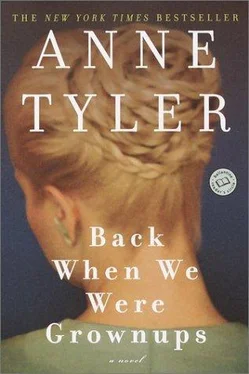She hoped they didn’t notice the ridiculous break in her voice.
* * *
When they got home again, bringing carry-out chicken and French fries for supper, they found Poppy playing solitaire on the coffee table in the front parlor. “I couldn’t stand it up in the family room,” he told them, “because that telephone kept ringing, ringing, ringing. Durn thing nearly rang my ear off.”
“Did you answer it?” Rebecca asked.
“No,” he said, “I let them leave a message. Yammer, yammer away on that benighted machine of yours.”
But when she went upstairs to check, she found only three messages. “Well, this here’s Alice Farmer,” was the first. “I know you don’t plan on no parties this weekend but I want to come in anyhow because I need the money. My brother’s girl Berenice is turning twenty. You remember Berenice, who’s afflicted with eating disorder…” Then she sort of wandered off, still talking but growing fainter.
The second message was a long pause and a click.
The third, recorded one minute after the second, was, “Rebecca, um, it’s Will.”
She drew back sharply.
“I was just afraid you might have gotten the wrong idea,” he said. “I don’t know why you felt you had to rush off like that. You didn’t even eat your salmon! The waiter asked if anything was wrong. I’m afraid you might have misunderstood me. Could you please call me back, please?”
She frowned at the machine for a moment. Then she pressed the Delete button.
* * *
Thursday morning she took the children to the zoo, where they spent some time commiserating with the dusty, panting lions. From there they went to the hospital. The baby was off getting circumcised, with Hakim (a cardiologist) watching from the sidelines and no doubt wringing his hands, and Min Foo was sitting up in bed doing a crossword puzzle; so Rebecca took a short walk in order to give the children a private visit with their mother. She stopped at the nursery window, where rows of infants lay in their cots like little wrapped burritos, and then she went back to the room. The baby had returned in a state of outrage and was being soothed and cooed over. Lateesha was sucking her thumb, which she hadn’t done in some time. Rebecca suggested to the children that they go home and have a picnic lunch in the backyard.
In the afternoon LaVon came by, Lateesha’s father, and carried the children off to watch his jazz band practice. (He was actually a fourth-grade teacher, but he had hopes of someday becoming a professional musician.) When he brought them back he stayed for Thursday-night supper; so Rebecca thought of his appearance as sort of a mixed blessing. Not that she wasn’t pleased to see him. He was a funny, charming, high-spirited young man, inclined toward African-print shirts and wild hairdos, so full of energy that he all but danced even when he was standing still. But Hakim was at supper too, and he tended to act somewhat bristly around his predecessor. Also, Min Foo would hear about this and throw a fit. “Why are you so nice to LaVon?” she’d be bound to ask. “Don’t you understand that he’s out of the picture now?” To which Rebecca would answer, “I can’t turn my feelings off like a faucet, honey, every time you choose to dump another husband.”
Although she did turn her feelings on, in a way, because she had always sworn that she would welcome newcomers to the family. She had promised herself that, Aunt Ida — like, she would declare her door to be permanently ajar, and she had kept her promise so faithfully that now she couldn’t say for certain whether she truly loved her sons-in-law or merely thought she did.
Anyhow, what difference did it make? They were good husbands, all of them — including Troy, the non-husband. Good husbands and good fathers. (Well, maybe except for Joey’s father, the antique Professor Drake, who had moved to some Greek island after his banishment and ceased all communication.) She smiled now to see how comfortably LaVon tipped back in his chair as he argued some musical issue with Troy, who taught theory at the Peabody Conservatory. Poppy was interrupting to say that nothing remotely worth listening to had been written after 1820. “My favorite composer is Haydn,” he said. “It’s true I used to think he was sort of music-boxy, but that was before I went to a concert and heard him play in person.”
“In… what?” LaVon asked, not having been exposed lately to Poppy and his lapses.
Rebecca hastened to tinkle a fork against her iced-tea glass. “Okay, everybody!” she said. “Time to propose a toast to Abdul!”
That was the name the parents had finally chosen for the new baby: Abdul Abdulazim. Rebecca liked pronouncing it. “To Abdul Abdulazim!” she said now. “His arrival makes us beam.” Abdul’s father, Hakim Abdulazim (whose name was even more fun to pronounce) sat up straighter and raised his chin proudly. “It’s such a pleasure to have a new boy,” Rebecca chanted, “Let’s hope he’s as nice as Lateesha and Joey!”
Hakim lifted his glass, and so did the two children, but the others just murmured, “Cheers,” and went on with their conversations. They heard so many toasts, after all. Rebecca could sympathize. It seemed she was constantly mustering enthusiasm for her family’s engagements and weddings and births, their children’s straight A’s and starring roles and graduations. Sometimes, for lack of any other reason, she proposed a toast to Thursday. “To Thursday once again, and so many of us together! To good food and good talk, and lovely summer weather!” (Or spring weather, or fall, or winter weather.) And that was not even counting all those professional events — her clients’ Christmases and New Years, their business promotions and mergers and retirements, their everlasting anniversaries and confirmations and bar mitzvahs and bridal showers.
Well. She squared her shoulders and turned to Hakim. “Now, about the baby-welcoming,” she said.
He looked worried. “This is what?” he asked.
“The party we give our new babies. It’s kind of a Davitch tradition,” she told him. “The idea came from one time when I was waiting for one of the girls at the airport and I saw this huge, happy, noisy crowd carrying balloons and placards and video cameras and regular cameras and flowers and wrapped gifts, and then the plane landed and a woman walked in with a tiny little button of a baby, Korean I think or Chinese, and the crowd started cheering and this couple stepped forward and the wife held out her arms and the woman gave her the baby and… I’ve always felt sort of cheated that we haven’t had any adoptions in our family. Adoption is more sudden than pregnancy, don’t you think? It’s more dramatic. So I said, ‘Why don’t we welcome our babies like that?’ And that’s what we’ve done ever since.”
Hakim blinked. Rebecca wondered, sometimes, exactly how good his English was. “Well, anyhow,” she said, “all I need from you two is a date. We can do it this weekend, if you like. The Open Arms isn’t booked. Or would you prefer just a Thursday? A normal family Thursday?”
“I will ask Min Foo,” he said. But he still looked worried.
It wasn’t a huge gathering tonight — just nine around the table. As usual, Troy and Biddy and Zeb were present — Biddy because she used Thursdays to experiment with new recipes, and Zeb because (Rebecca suspected) this was his only chance for a home-cooked meal. He would go home laden down with leftovers, she always made certain. It used to be that NoNo had been a regular too, but since the wedding they’d hardly seen her. Well, that was as it should be, of course. She was establishing her own traditions now.
Last week, NoNo had phoned Rebecca and asked how people formed car pools. Peter’s school was due to reopen and she would be in charge of his transportation. “Do I put an ad in the paper?” she’d asked. “Tack a note to a bulletin board? Or what?”
Читать дальше












